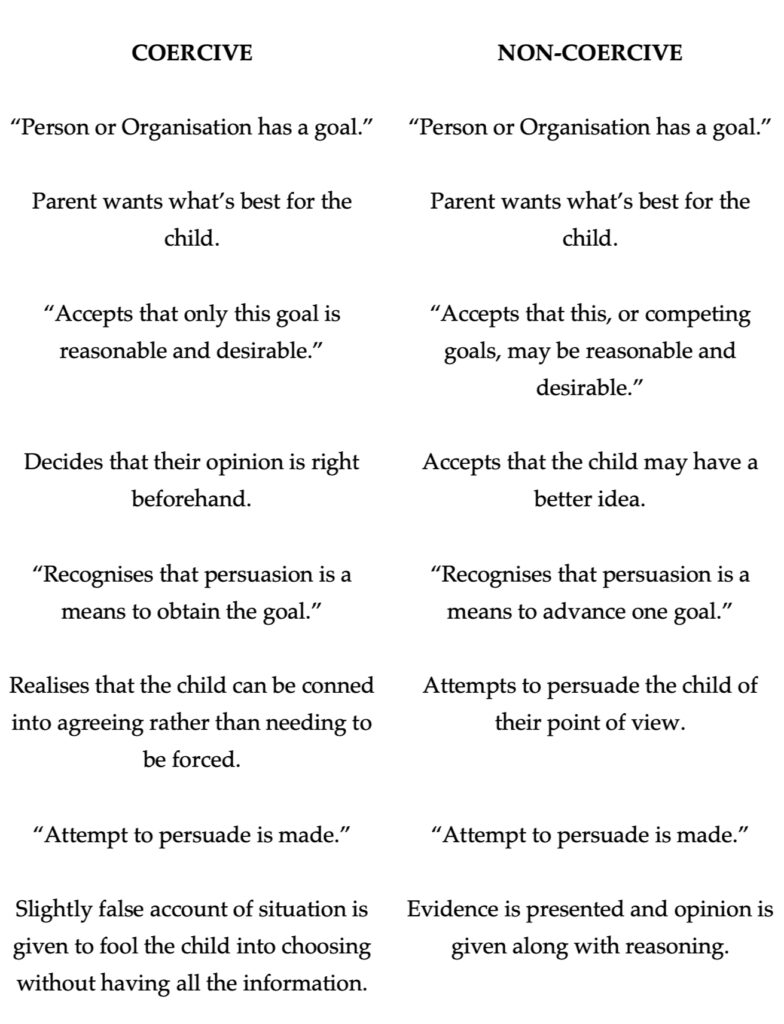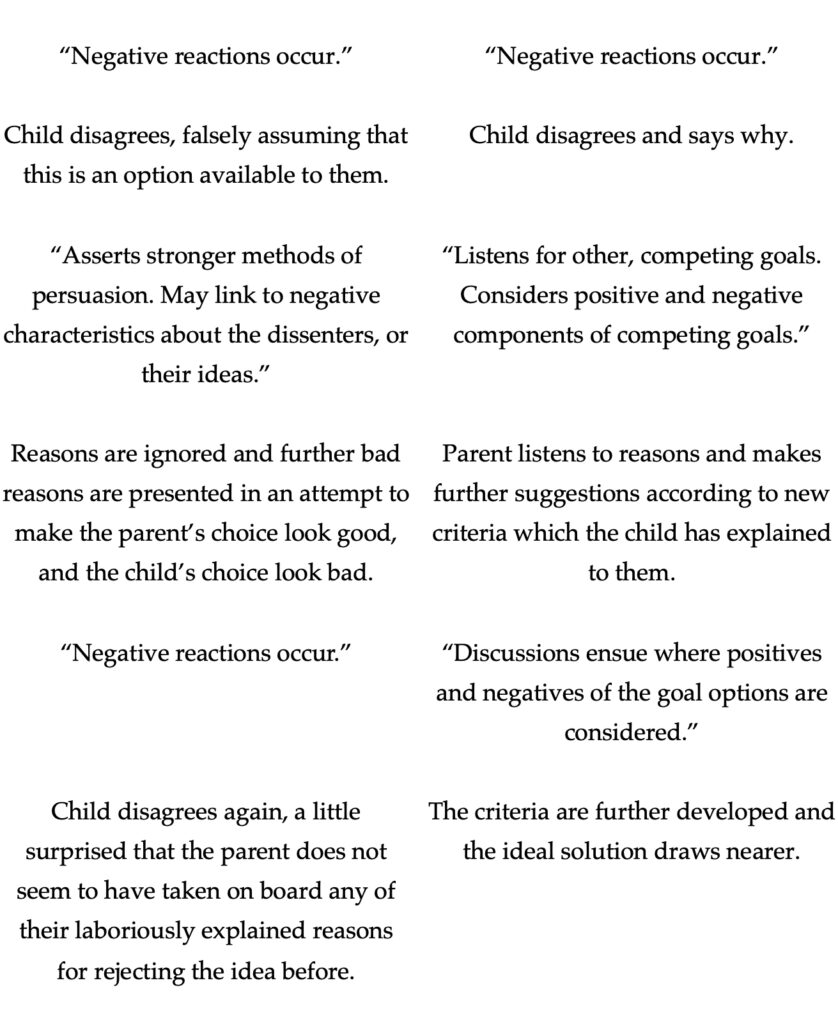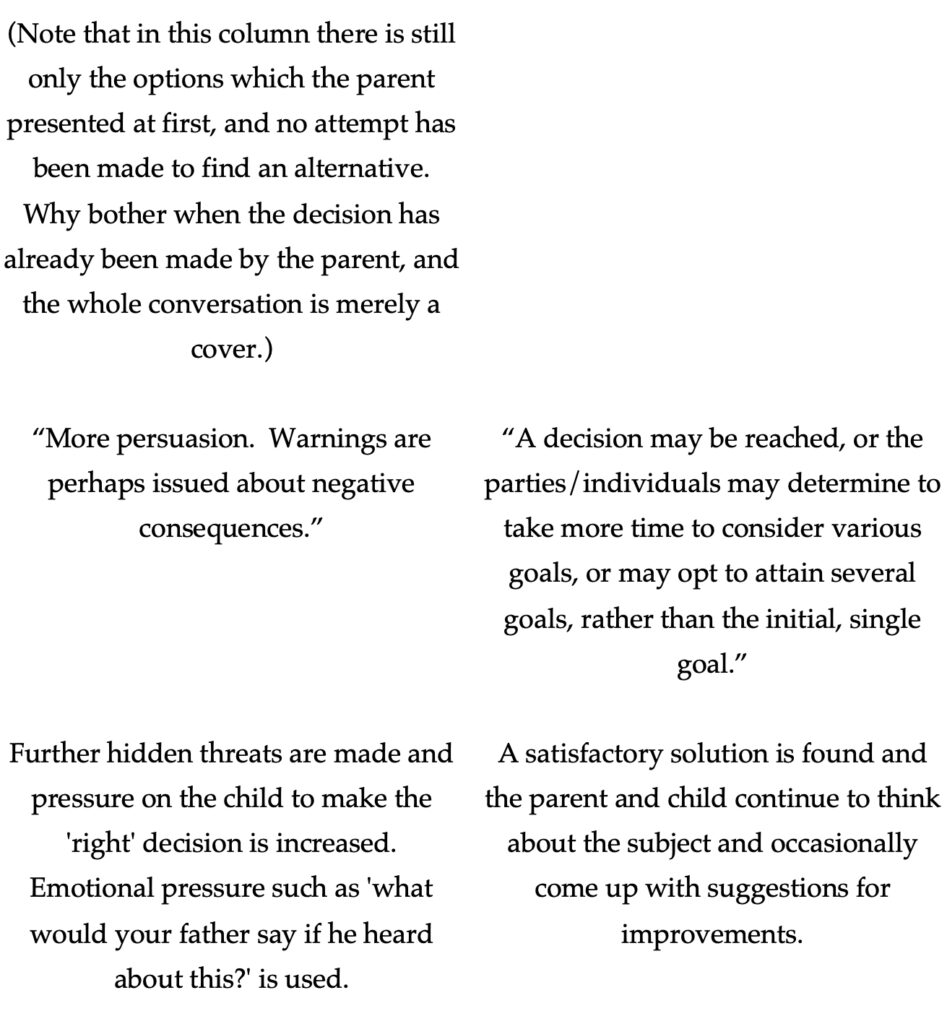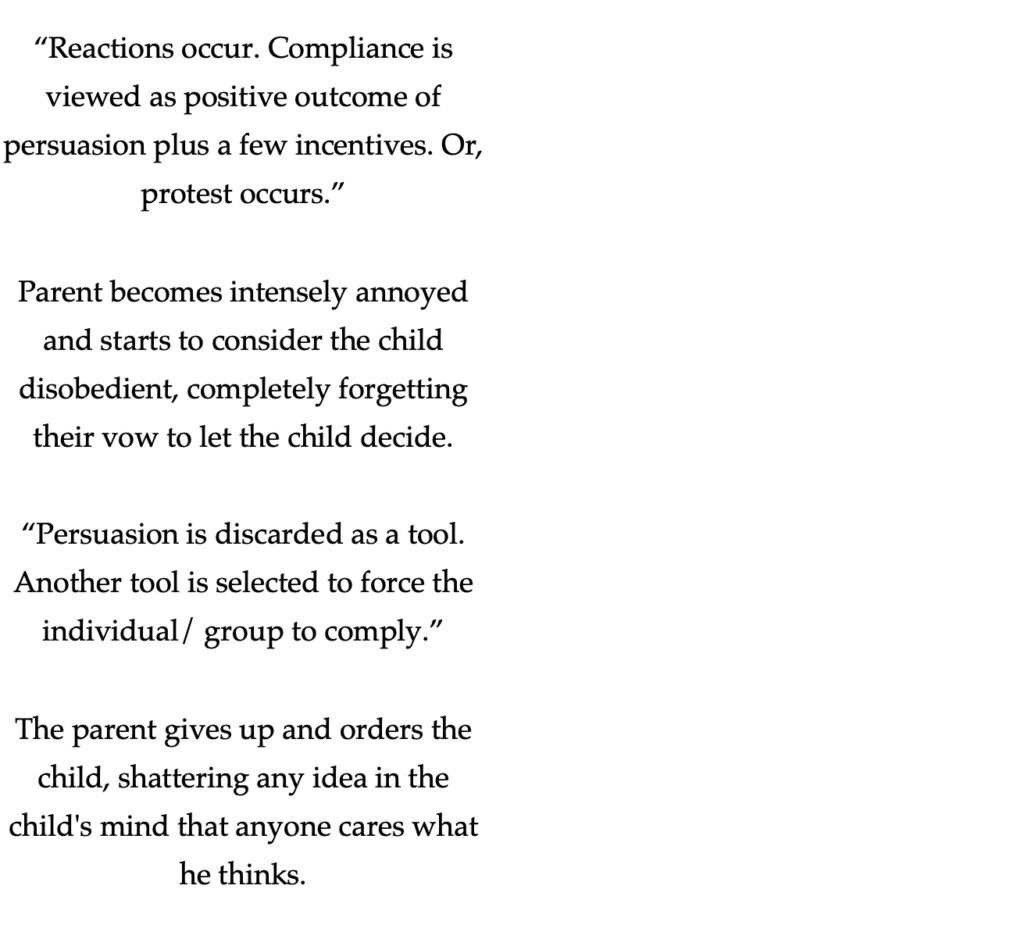“In the non-coercive family, the parent does not try to shape the child’s decision; in the coercive family the parent sometimes does and sometimes doesn’t. Doing so is wrong.”
– Nick
From the archives: Posted on 12th December 1996
Hi, it’s me again. Nick. You know, the kid.
Aaaannnyyywwwaaayyy…
“Just a side note here, Rane. The organizational needs of schools require that children comply to authority.”
I entirely agree.
“I don’t see how educators can completely escape this reality.”
Of course they can’t.
“They can reduce their assertions of authority,”
Yes…
“but they nonetheless must maintain order.”
Bullshit. (Aha, you thought I’d gone insane didn’t you? admit it.) You see, in order to run a school it is necessary to force the children to comply. You could not run a school where the children were free to leave at any time, because a school is a place of such mind-numbing boredom and total soul destroying pain that you could not persuade a teacher to stay were it not for the fact that they were being paid. You see, it is true that a slave must be beaten to make him work, but you are drawing from this reasoning that it must be necessary to make him work in the first place. If anything, the logic of this is exactly the opposite. If the child/slave must be punished to make them learn/work, then there must be something wrong with what you are trying to make them do—in fact, something so wrong that under certain circumstances the subject is prepared to risk beating to avoid doing it.
Now you can say that all the children in the world are wrong, and that all the teachers are right, and you can provide some nice chunks of pseudo-scientific evidence to support your claim, but why is it that there is never any doubt about the oppressed being wrong, but that the oppressor is wrong is unthinkable? And why does the oppressor always feel the need to lower the status of their victim. Do mothers of non-coerced children ever shout at people who criticise them and say that they have obviously never seen a real child? Do children ever tell adults that they are not mature enough to understand why they are wrong? Did Jews ever tell Nazis that they were inferior and must be exterminated? No. I’ve never told anyone who disagrees with me that they are mentally inferior to myself. I’ve never told anyone that they are too stupid to understand what I am getting at. I don’t need to, because I know that I am right about this and I have evidence to back me up. So when you tell me that you think children must be beaten to make them learn why don’t you give me some evidence that would still apply if I was older than you and had twice as many children? I suspect that you can’t.
“The tool of persuasion is a kinder, gentler tool of power, but there is no escaping that persuasion is a form of power.”
Persuasion is not a form of power, and here is how I escaped. There are really two types of persuasion here. They are very different but you are treating them as the same. There is the “I recommend you do this because otherwise something I can’t prevent is going to hurt you.” And then there is the “I recommend you do this because otherwise I’m going to hurt you.” There is also a third, i.e. “I recommend you do this because otherwise something I can prevent is going to hurt you” this can fall into either of the categories depending on whether the sayer has a responsibility to stop it or not. I’ll give you a few examples:
Parent says to their child “You ought to go to school on time because otherwise a teacher will punish you.”
This falls into the second category because it is up to the parent to tell the teacher to fuck off and leave there child alone.
Parent says to someone else’s child “You ought to go to school on time because otherwise a teacher will punish you.”
This falls into the first category because the parent has no responsibility to someone else’s child.”
And then there is the obvious:
Parent says to child you have to go to bed early because otherwise you won’t be able to watch television tomorrow.”
This falls into the second category because the parent is creating a totally pointless and vindictive obstacle which the child must work their way round.
So what’s the difference? Well, the first category is where you have some advice for someone about how to make the best choice in a situation, and are trying to convince them that you are right. The second category is where you want someone to do something and instead of forcing them, you have decided to errect one or more unpleasant obstacles so as to force them into choosing the way you wanted, well still leaving them (and maybe yourself) with the impression that they made the choice and so cannot hold you responsible for their pain.
Of course, not all situations involving persuasion will involve pure good and bad. It may come down to finding the best of two goods or the least bad of two evils but whatever the situation, the same principle applies, persuasion is not a form of power in itself, but it can be used to disguise it.
“If educators can persuade children to do as they want them to do, it feels more ‘democratic’ than to authoritatively command that children perform or desist, or whatever goal is perceived as needing to be met.”
Of course it feels more democratic, if it didn’t then people wouldn’t bother. But the point is that it isn’t. If the teacher persuades a child to stop by telling them (perhaps in a disguised way) that they will be punished if they don’t then it is no better than ordering them. In either case the child has the option of stopping or being punished and it is for them to choose. Actually telling them that they have this choice does not improve the situation in the least. If anything it can make it worse, by lulling the child into a false sense of being in control of his own life when he isn’t.
“Of course children have power.”
Umm… I think you’re wandering into the realm of word re-definition. If the child’s opinion can be disregarded then in what way do they have power? The power to do nothing perhaps?
“The educator, however, must at times subvert that power. (I discuss this more below.)”
(Me too.)
“Families are not schools. How does persuasion work differently in the non-coercive family? This seems to be the question you are trying to resolve.”
In the non-coercive family, the parent does not try to shape the child’s decision; in the coercive family the parent sometimes does and sometimes doesn’t. Doing so is wrong. (For clarification, by ‘shape’ I do not mean give the child advice and recommend a course of action, I mean underhandedly alter the situation to try and get the child to do what you want without having a good reason. Refer back to earlier section for further clarification.)
“I’ll set up a table which contrasts the coercive, and the non-coercive, forms of persuasion (as I see them).”
I’ll try and make this more accurate/clearer.
[The following table quotes and comments on the poster’s own table.]




“In both scenarios, the original goal may have been perfectly reasonable, perfectly harmless, and kindly benevolent. What distinguishes the weapon of persuasion from being a benign power tool or an agent of harm is not the tool itself.”
It is rare that someone changes their opinion mid post but that would seem to be correct.
“Rather, the original theories underlying the choice are at fault.”
Ummm… surely that would depend on what the choice is.
“The differences in the underlying theories are the willingness to accept alternative goals/theories, and the willingness to adopt a bigger gun if persuasion fails.
Being a person who is persuasive is not an automatic negative thing. Being a leader of followers, because of that persuasive ability, is not an automatic negative thing.”
If you mean leader as in lets everyone do what they think best then no. But in what sense then is it being a leader? If you mean leader as in listening to everyone’s suggestions, but in the end making the decision, then it is automatically bad. A person is only qualified to make decisions about themself in cases where a joint project is necessary then all decisions should be unanimous. This is why a parent should not make decisions for their child. Because regardless of their experience, they cannot make decisions which affect other people’s lives, they can only make suggestions based on their knowledge.
“For example, there are times when a child might persuade an adult that the child’s views, are, in fact, more perceptive and creative than the adult could begin to imagine. So the adult chooses to follow the lead of the child. There is nothing wrong with this when both parties know that no harm will occur to either party. Similarly, when a child chooses to follow the lead of an adult, there is nothing wrong with this when both parties know that no harm will occur to either party.”
I’m not quite sure what you mean by “when both parties know that no harm will occur to either party.” There is nothing wrong with this, period. Even in life and death situations a person should still be allowed to choose what to do and who to agree with. Even if it means that getting it wrong could end in their death. Your statement suggests that in situations of danger then it should no longer be up to the person in question. I hope you aren’t implying that the adult should choose for the child in such circumstances, because what if the adult gets it wrong and the child dies? In such a situation would not the adult be directly responsible for causing the child’s death by ordering them to do something which would kill them? Surely letting them send themselves to their own death is better than you sending them to it against their will.
“These realities, though, are easier to attain within a family unit.”
Only because of the prolonged proximity of the members to each other.
“Schools cannot offer a similar range of freedoms between one adult and thirty children (each with potentially competing theories) to negotiate goals. At least, not a modern public school environment which is subject to not only the demands of teachers and children, but of administrators, school boards, state, and federal governments, parents, and voters. They lack the liberty to define their own goals especially in the U.S. case where states are mandating more goals, new assessments, and linking high stakes outcomes to those goals for teachers and students.”
Yes, yes, but now you have changed the situation totally. it is not because of the number of people involved. It is because the children are all there against their will and the teacher is making them do things which are unreasonable and unpleasant. If the children were all there voluntarily, and the teachers were all prepared to accept the children’s opinion and go along with their suggestions then the situation would work just as well, though it would take longer to reach decisions which suited everyone. But then the place would not be a school. The reason that schools are not voluntary is because you cannot ever get someone to agree to be actively bored voluntarily. It is not because they are bigger than houses. It is akin to saying that prison camps are non run democratically because of the number of inmates, rather than because they would all vote to let themselves free, and the prison camp would cease to exist.
“At the building level, and within the classroom, yes, certainly, some individuals can make a difference and use persuasion without any negative attachments involved … until such a time when conflicting goals/theories occur. But when it comes time for the bell to ring, or that latest state assessment to be delivered, or for the practice fire drill to occur, then persuasion may have to be dumped for the larger tools that are more apparently negative.”
No. For the less effective tools which are more negative. Do you really believe that in the case of a fire you would have to force people to leave? Do you not think that if you tell them that the fire drill is to increase their chance of survival in a fire, and that they don’t have to come if they don’t wish, but instead could come to the next, or the one after that, then they will blankly refuse? Of course they won’t! there’s nothing to refuse, they can only agree because their isn’t a third option they can pick. This way you will greatly increase the chance that when there is a fire and you aren’t around to force them, they will go anyway.
On a different strand, I really object to the way you use the term ‘when it comes time for’ in totally inappropriate circumstances. In what way is it ever ‘time for the bell to ring’? You suggest that this is some predetermined thing which must be done. What you mean is ‘when the headmaster decides that the children’s freedom should be unceremoniously halted so that he can cram a full eight lessons into the day to balance his books.’ In what way is that the time coming?
It’s no more necessary than a murderer killing someone.
“Similarly, most larger organizations will have difficulty using persuasion benevolently. Yes. They may be most successful with it much of the time. Nonetheless, when push comes to shove, authority reasserts itself, and persuasion may be discarded for an alternative tool to gain compliance.”
If, by ‘larger organisation’ you mean a prison then I agree. If you mean a business then I disagree because in a business an employee will quit if he is mistreated and ordered to do things he does not approve of. If it is necessary to order people around then is either because the task is wrong or the people do not have the right to choose. In a prison the inmates have forfeited their right to choose by committing a crime. In a school, however, it is because the task is wrong…
See also:
- What do you mean by non-coercive? What is the difference between coercion and non-coercion?
- Help! Child hates eyepatch!
- What does “active” mean if not “preferred”?
Nick, 1996, ‘Coerciveness vs non-coerciveness’, https://takingchildrenseriously.com/coerciveness-vs-non-coerciveness

